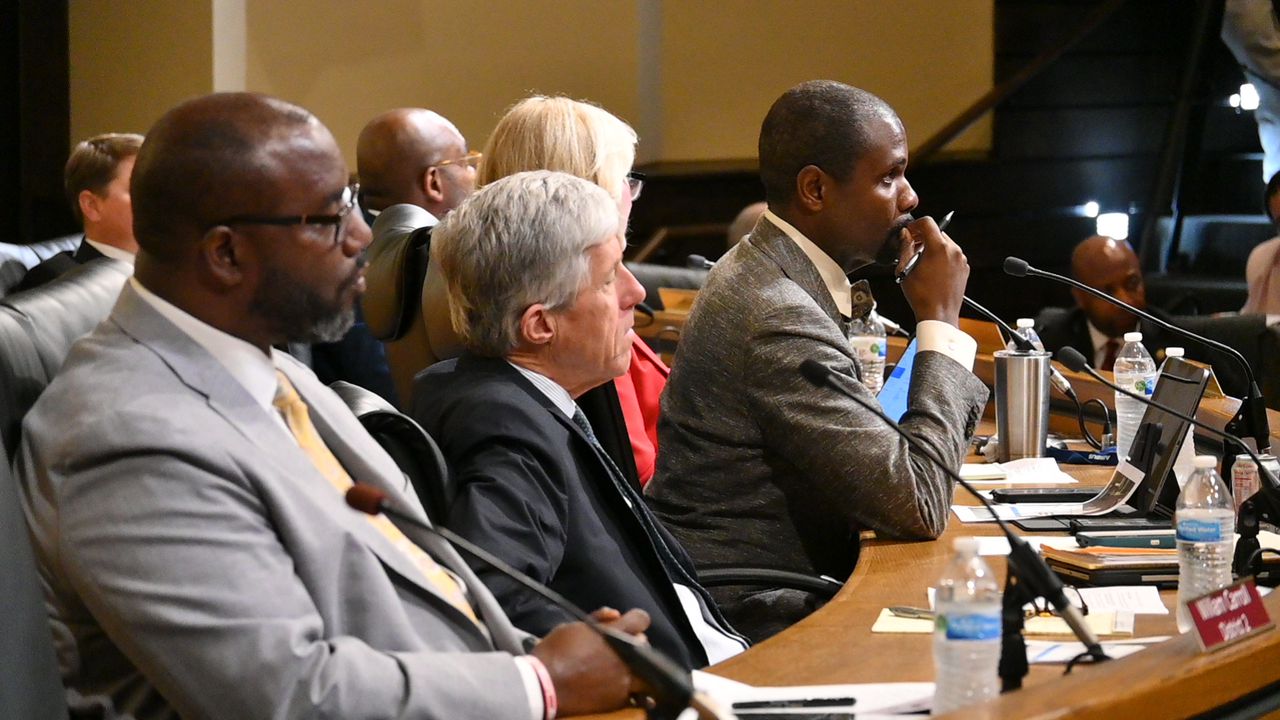Ladd-Peebles Stadium hang up in Mobile could come down to future size of stadium
The future size of Ladd-Peebles Stadium could be the main hang up over whether the 75-year-old football stadium should be sold to the state’s largest public school system.
According to Mobile County School Board Johnny Hatcher, a chief concern has to do with the “integrity of the stadium” and any alterations the school system might consider to make the venue attractive for hosting high school football games.
“We don’t need 40,000-plus seats for a high school football game or any game,” Hatcher said Thursday, one day after the Mobile City Council abruptly adjourned its meeting after three council members abstained on the weekly agenda.
The Mobile City Council listens to the public speak during the council’s meeting on Tuesday, May 9, 2023, at Government Plaza in downtown Mobile, Ala. (John Sharp/[email protected]).
Hours later, the council member released a statement saying they were concerned over a pending sale of Ladd-Peebles Stadium to the Mobile County School Board.
“We want to do what is best for Mobile County Schools and that whatever we would do would benefit the City of Mobile greatly,” Hatcher said. “But if they have unrealistic expectations from us, there is nothing we can do. We have to do what is best with Mobile County tax dollars.”
The three council members – Council President C.J. Small, William Carroll and Cory Penn – have been quiet about the matter, beyond releasing a statement Wednesday evening that said they dissented to approving the agenda because of their concerns over the stadium’s sale.
“They hold the view that the existing lease agreement fails to garner adequate support to preserve the community’s cultural identity and does not acknowledge the stadium’s economic significance,” the statement, sent by council spokeswoman Ashley Flores, said.
The Mobile County School System’s administration did not release a statement on Thursday, and neither did Mobile Mayor Sandy Stimpson’s office.
Danny Corte, executive director with the Mobile Sports Authority, said that reduced seating at Ladd-Peebles Stadium could still enable the venue to host HBCU football games, which city officials covet as part of an agreement to sell it to the school system.
The council, in June, authorized the sale of the stadium to the school system, and backed an intergovernmental agreement to do so. Part of the agreement included a vow that the school system allow the city to use the venue for certain events, particularly HBCU football games.
The largest crowd to attend an HBCU game in recent years was last November, when the Deion Sanders-coached Jackson State Tigers played against the Alabama A&M Bulldogs. A crowd of approximately 32,000 attended the game.
Ladd-Peebles Stadium’s capacity is 40,646. Few football games hosted at the stadium have reached a sellout in recent years.
Hatcher said Ladd-Peebles, under the school’s ownership, would be primarily utilized as a home football stadium for Murphy High School. He said the stadium, even with reduced seating, would be attractive to host other events and could be utilized as a sports complex.
“We could bring in state championships and host a lot of things like that,” he said. “I think it would be very utilized.”
The council’s actions seem to have perplexed city and school officials, who were unaware of the concerns over the stadium deal. Nothing pertaining to Ladd-Peebles Stadium was on the council’s agenda for consideration.
School Board member Sherry Dillihay-McDade, who represents the area where the stadium is located, said she was unaware of the particulars over the council’s concerns and declined further comment.
The council’s delay of hosting the meeting did postpone a vote on an agreement between the city and the School Board over a 99-year lease of city-owned park property so that Williamson High School could build an on-campus football stadium. That project would be adjacent to Ladd-Peebles Stadium but it is largely viewed as unrelated to the stadium’s overall project.
A ceremonial groundbreaking for the Williamson High School stadium has already taken place.
Said Hatcher, “I would like to think what they did at the meeting was a happenstance and not being vindictive toward the property at Williamson. I don’t think it’s malicious at all.”
The city, as of last month, was agreeing to provide $9 million in maintenance and renovation costs over the next 10 years to improve the aging stadium. Additionally, the city is spending $1 million this year on field repairs.
The agreement and the pending sale are under consideration by the school system. A final agreement, if altered to negatively impact the surrounding community of Maysville, would have to come back to the council for another consideration.
